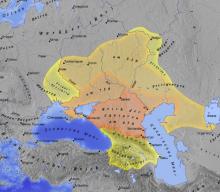Though much of the widely known history of Jewish culture in the Middle Ages concentrates on the increasing marginalization of Jews in Europe, Africa and the Arab world, there's a curious and vital chapter that takes place in Eurasia between the 6th and 11th centuries C.E. Over a vast area between the Black Sea and the Caspian Sea, then later extending north to modern-day Russia, a multi-ethnic group of people known as the Khazars maintained a fairly stable empire. Between one and two centuries into their rule, the Khazar royalty and nobility famously converted to Judaism and made it their official state religion. This stronghold of Jewish culture helped preserve Judaism in a time when it came very close to being swallowed up by the competing forces of Christianity and Islam.
It seems unusual considering the state of relations between different religious groups today for a medieval empire to adopt Judaism as its central faith, but in the context of international politics circa 600-1100 C.E. it was a wise, though no less intriguing, social maneuver. At the time of the Khazar's conversion (the date of which is unclear but likely occurred in the mid 600's), the solidly Christian powers of Europe were starting to conflict with the rising Muslim nations of Africa and Asia. Khazaria was located directly between the two worlds, acting as a sort of buffer between the likes of Byzantium and the Arabian Caliphate. Though Jews were certainly marginalized in that era they were still permitted to practice their religion openly in many cultures. At best they were seen as being a neutral party among monotheistic societies. As such, Judaism was a shrewd choice for the precariously positioned nobility of the Khazars.
That's not to say the Khazars were simply Jews on paper. The country's central location also served as a viable refuge for persecuted Jews on both sides of the Christian/Muslim divide. Jews from Byzantium, Persia, Arabia and other scattered locations flocked to Khazaria where they could live freely. Before the state conversion, Khazaria was fairly multicultural. Old Turkic polytheism, specifically the cults of Tengri, was still widely practiced there, as was Judaism, Islam, Eastern Orthodox Christianity and a variety of other faiths. So, Judaism already had a fairly significant presence in Khazaria by the time of the conversion.
There was also a significant economic advantage to state Judaism for the Khazars. The Khazar Empire's existence coincides with the centuries during which the Radhanite merchants operated. The Radhanites were Jewish merchants who had an extensive network of trade routes across Asia, Africa and Europe, using their neutral status as Jews to buy and sell goods between cultures that were officially in conflict. They were the great middle men of the Middle Ages, and Khazaria was a regular stop on their trade expeditions. They certainly would have had a lot of influence in the country and it would have been in their best interests to financially and politically support a Jewish state.
The Khazar Empire endured a slow but steady collapse throughout the Tenth Century C.E. thanks to a combination of over-extension, diplomatic failures and near-constant conflict with invading nomadic forces such as the Vikings of Northern Europe and the Kievan Rus. Khazaria was eventually consumed in pieces by other empires that rose in the late Middle Ages and the already multi-ethnic population ceased to have a distinct cultural identity. Still, a Jewish nation had a significant amount of influence in global politics during the unstable days of the Middle Ages and allowed a Jewish population to thrive in a territory that would eventually be the ancestral home to a slim majority of modern people of Jewish descent.
